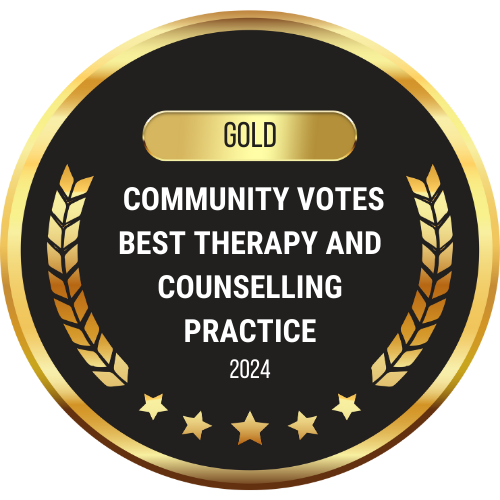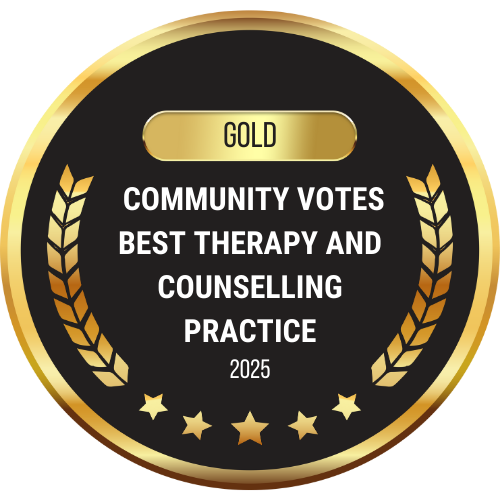At a glance
Acceptance & Commitment Therapy (ACT)
Acceptance and Commitment Therapy (ACT) is a therapeutic approach that blends acceptance and mindfulness techniques with commitment and behaviour-change strategies. It focuses on helping people embrace their thoughts, feelings, and emotions rather than suppressing, avoiding, or controlling them. Rather than focusing on what is outside of your control, you’ll instead focus on what you can personally control.
ACT is beneficial for a variety of mental health conditions, including trauma, chronic pain, eating disorders, OCD, anxiety, depression, and stress. It’s also a fundamental tool to improve overall well-being.
With the help of therapy, you’ll gain confidence in your ability to handle thoughts and feelings without needing to control them.
Art Therapy
With Art Therapy, creative expression is used to improve a person’s mental, physical, and emotional well-being. Different types of materials and techniques are used to help an individual express themselves. This may include painting, drawing, sculpting, or putting together collages. As an individual expresses themselves creatively, they are able to work through personal challenges, express their emotions, and gain self-awareness.
Art Therapy is commonly used with children, but may also be used with adolescents and adults. It is particularly helpful if someone has difficulty finding words to express their feelings. It allows the free-flow of unconscious thoughts, which are then expressed creatively. Thus, it’s an effective technique to help externalize feelings and thoughts that are difficult to communicate. Art Therapy can help with processing emotions, improving self-esteem, reducing stress, decreasing anxiety, and developing coping skills. It can also help with connection and communication with others.
Attachment-Based Therapy
Attachment-Based Therapy focuses on understanding how the bonds formed early in life impacts emotional health and relationships in later life. It is commonly used for individuals who are experiencing challenges with their interpersonal relationships, have experienced trauma, or struggle with emotional disorders. It can also be used with parents or guardians wanting to strengthen or improve their relationship with their children.
By going back in time, you can gain a better understanding of your behaviour patterns and subconscious attachment styles. You can then work towards redeveloping different patterns using techniques such as cognitive reframing, emotion-focused strategies, and mindfulness.
If you’re ready to form better or healthier interpersonal relationships, gain a better understanding of yourself, reduce anxiety, and increase your capacity to manage emotions, Attachment-Based Therapy may be for you. Click below to book an appointment or free consultation!
Clinical Hypnosis
Clinical hypnosis (hypnotherapy) works by inducing a state of focused attention and relaxation. Once settled, the therapist helps explore thoughts, feelings, and memories that are buried in the subconscious mind. This may involve visualizing living in the ideal state. For example, living without pain, being in a calm situation, or working through a future scenario that is usually symptom-inducing. Clinical hypnosis is a powerful technique for various concerns including addiction, pain, stress, anxiety, and depression.
If you are interested in clinical hypnosis, please get in touch with us to determine whether this therapy may be right for you.
Cognitive Behavioural Therapy (CBT)
Cognitive Behavioural Therapy (CBT) is a form of psychotherapy that is focused on helping individuals identify and manage the underlying causes of their mental and emotional struggles. CBT is a highly effective treatment method used to reduce symptoms associated with a range of mental health issues, including depression, anxiety, panic attacks, phobias, eating disorders, and substance abuse. By examining the relationship between thoughts, feelings, and behaviours, CBT can help individuals gain insight into how their thoughts create their feelings and behaviours, thereby empowering them to make lasting changes in their lives.
Cognitive Processing Therapy (CPT)
Cognitive Processing Therapy (CPT) is a type of Cognitive Behavioural Therapy commonly used to treat post-traumatic stress disorder (PTSD), depression, anxiety, and other trauma. CPT works by focusing on changing thoughts and beliefs related to the distressing traumatic experience or event. When working with a therapist, you’ll identify and challenge negative thought patterns and work to replace them with more balanced ones. Oftentimes, you’ll write about the event so that you can process and make sense of the traumatic experience. As a result of CPT, you may experience improved emotional regulation, increased self-esteem, and greater control over your emotions.
Compassion Focused Therapy (CFT)
Compassion Focused Therapy (CFT) is a type of psychotherapy where the focus is on developing self-compassion and positive emotions. CFT brings together numerous techniques including mindfulness, behavioural and cognitive therapy. The purpose is to reduce self-criticism and negative emotions, and increase feelings of warmth, love, and kindness towards yourself and others. CFT can be used for various mental health concerns.
Compassionate Inquiry
Compassionate inquiry was created by Dr. Gabor Maté as a way to help individuals uncover the thoughts and feelings that lead to certain behaviours. It is used for various concerns, including stress, depression, relationship challenges, addictive behaviours, and for individuals who have experienced some form of trauma.
With compassionate inquiry, a therapist will ask questions that help people dive deep and explore their experiences and feelings. This is used to uncover how past experiences (including traumas or beliefs) affect current behaviours. The intent is to create a level of awareness, curiosity, and individual acceptance without any form of judgment.
Develop deeper connections and feel more in control of your emotions with compassionate inquiry.
Dialectical Behavioural Therapy (DBT)
DBT, or Dialectical Behavioural Therapy, is a type of therapy that has been scientifically proven to help individuals struggling with a variety of mental health issues. It works by teaching people mindfulness, distress tolerance, emotion regulation, and interpersonal effectiveness skills. DBT is most often used to treat borderline personality disorder, as well as anxiety disorders, depression, and eating disorders. With the help of a qualified therapist, clients can learn to become more skilled at managing their emotions and developing healthier relationships. DBT can be an incredibly powerful tool for those who are looking to gain control over their mental health and live a more fulfilling life.
Emotion Focused Therapy (EFT)
Emotion-Focused Therapy (EFT) is a powerful, evidence-based approach to counseling, focused on helping individuals recognize and process their emotions. By exploring underlying patterns of emotion, clients gain insight into their behaviour and the connections between their thoughts, feelings, and actions. EFT is especially beneficial for those struggling with depression, anxiety, trauma, and relationship issues. Through this therapy, clients can learn to express and manage their emotions in a healthy way, resulting in improved mental health and overall wellbeing.
Exposure Response & Prevention Therapy (ERP)
Exposure & Response Prevention (ERP) Therapy is a type of Cognitive Behavioural Therapy (CBT). It is often used to help individuals with OCD and related conditions. With ERP Therapy, you are exposed to situations or objects that cause a trigger and work towards reducing resulting compulsive or ritualistic behaviours. Similar to Exposure Therapy, you work with a therapist to identify a hierarchy of situations you can be exposed to over time. You start with the least anxiety-provoking situation and work towards exposure to the highest anxiety-provoking situation. When you are exposed to these experiences, you aim to reduce compulsive and ritualistic behaviours and gradually learn to tolerate the discomfort associated with exposure to the feared stimuli.
Exposure Therapy
Exposure Therapy is a type of Cognitive Behavioural Therapy (CBT) intended to help overcome fears and anxieties. To do this, you are gradually exposed to the feared object or situation in a safe and controlled environment. Together with the therapist, you will determine a gradual hierarchy of the feared situations or objects that you work through over time. It is commonly used for anxiety disorders, obsessive-compulsive disorder, and PTSD. However, it may be used in other situations. Exposure Therapy can help reduce the intensity of anxiety, improve emotional regulation, and ultimately lead to greater self-esteem.
Eye Movement Desensitization & Reprocessing (EMDR)
Eye Movement Desensitization and Reprocessing (EMDR) is a type of therapy intended to help people who have had traumatic experiences in their lifetime. During EMDR, a therapist will take you through guided eye movements and other forms of bilateral stimulation (e.g., tapping or tones) while you recall the traumatic event or negative thoughts you are seeking support for. Recalling the events or emotions this way can help reduce the distress associated with them. It is used for a variety of mental health concerns, including PTSD, other traumas, anxiety, and depression. The goals of EMDR include reducing the intensity of symptoms, improving emotional regulation, and increasing self-esteem.
Gottman Method
Some of our therapists are trained in the Gottman Method. This method is used in couples therapy with the focus being on building trust, enhancing intimacy, and developing better communication. With the help of a therapist, you will work together to identify and address patterns of negative communication and behaviours contributing to challenges in the relationship. The specific experience will vary depending on the therapist and your needs; however, it may include role-playing and guided conversations. By going through these scenarios, you can start to improve your communication and conflict resolution skills. The Gottman Method is used for a variety of relationship challenges, including conflict related to sex and intimacy, parenting and family dynamics, and communication challenges.
Humanistic Therapy
With Humanistic Therapy, the focus is on what makes an individual unique, their creativity, and strengths. It is a powerful approach to gaining a deeper understanding of oneself and can lead to greater connection, meaning, improved self-esteem, and clarity in making life decisions. It is commonly used to address concerns such as anxiety, depression, stress, and relationship issues.
In Humanistic Therapy, the therapist provides an empathetic and non-judgmental environment to express oneself and explore feelings, thoughts, and behaviours. This can lead to improved self-awareness and personal growth.
If you’re ready to feel more in control of your life and improve your overall well-being, book an appointment!
Internal Family Systems (IFS)
Internal Family Systems (IFS) Therapy is based on the idea that the mind is made up of multiple sub-personalities or “parts”. Each of these parts has its own viewpoints, emotions, and characteristics.
In IFS Therapy, the therapist will help the client identify and understand each of the parts that make them whole. By deepening the relationship with each part, there is an opportunity to gain insight into the patterns and beliefs causing distress.
IFS is used for a variety of concerns, including trauma, depression, anxiety, and interpersonal relationships. It can also be used for personal growth, self-understanding, and self-development.
Start feeling more whole by understanding the “parts” that make you you!
Interpersonal-Informed Therapy
Interpersonal Therapy is used to improve relationships and social functioning. It uncovers how our social interactions impact our mental health. Interpersonal Therapy is used for individuals going through life transitions or experiencing other concerns such as depression, grief, anxiety, or interpersonal difficulties.
With IPT, a therapist guides the client through their current relationships and social roles to uncover any subconscious problematic interpersonal patterns contributing to distress. The focus is on improving communication skills, learning to express emotions in a positive and effective way, and addressing issues within current relationships.
Mindfulness-Based Therapy
Mindfulness-Based Therapy is a therapeutic approach that integrates mindfulness and Cognitive Behavioural Therapy (CBT). It aims to help individuals cultivate awareness and acceptance of their thoughts, emotions, and experiences. The goal of Mindfulness-Based Therapy is to reduce the distress caused by thoughts, emotions, and experiences to improve overall well-being. The exact approach will depend on your needs and your therapist. However, you will be encouraged to engage in meditation and/or mindfulness practices. This may include breathing exercises, mindful movement, and body scans.
As part of Mindfulness-Based Therapy, you may be asked to work towards identifying and challenging negative thought patterns so you can develop positive coping skills. This modality is used for a variety of mental health concerns, including anxiety, stress, depression, and chronic pain. By creating an increased sense of connection to the self and others, you can experience a greater sense of purpose in life.
Music Therapy
Music Therapy is a unique therapeutic modality that harnesses the intrinsic properties of music to address physical, emotional, cognitive, and social needs of individuals. Through creating, singing, moving to, and listening to music, individuals can express feelings, improve motor skills, enhance memory, and foster a deeper connection with their inner selves.
The non-verbal nature of music therapy makes it a useful tool for young children and adults with developmental delays, Alzheimer’s disease, or traumatic brain injuries. Guided by trained music therapists, this modality offers a non-verbal pathway to healing and personal growth, resonating with the rhythms of one’s soul.
Narrative Therapy
With Narrative Therapy, you will focus on the stories you create about yourself, your experiences, and others. To create change, you will work towards rewriting these stories to be more empowering and positive. This can ultimately impact your overall quality of life and the strength of the relationships you have with others. With a therapist, you will explore your life experiences to uncover how they have shaped both your beliefs and identity. Narrative Therapy is often used for anxiety, depression, and trauma, but it may also be used for a variety of other mental health concerns. As a result of Narrative Therapy, you may feel a greater sense of control over your life and have a new perspective on past experiences.
Neurofeedback Training
Neurofeedback is a therapeutic technique that uses a computer-based program to assess brainwave activity. This program uses sound and/or visual signals to rework brain signals. Neurofeedback training can help regulate brain activity and support conditions such as ADHD, anxiety, depression, sleep disorders, PTSD, trauma, chronic pain, and more. It has been used for improving focus and clarity, relaxation, enhancing mood, and reducing unpleasant symptoms.
During a Neurofeedback session, small electrodes (sensors) are placed on the head to measure brain activity. The computer can then analyze the brainwaves to provide real-time feedback with visual or auditory signals. Based on the feedback (or signals), brainwave patterns can be modified.
Play Therapy
Play Therapy is most often used with children and involves using play as a way for children to communicate and express themselves. Kids naturally use play to explore their environment and emotions. Thus, it is a great way to help children express their feelings and work through psychological issues. As part of play therapy, the therapist may use a variety of materials and techniques that are engaging for children. For example, puppets, dolls, art materials, or sand play. It is used in both individual and group settings for various mental health concerns, including anxiety, depression, trauma, and behavioural difficulties, and can be used in individual or group therapy settings.
Solution Focused Brief Therapy (SFBT)
Solution Focused Brief Therapy (SFBT) is a collaborative approach to therapy that focuses on identifying and achieving goals in the present while keeping the future in mind. SFBT is widely used to help people with a range of psychological and emotional conditions such as depression, anxiety, post-traumatic stress disorder, relationship issues, and more. It is based on the belief that clients are experts in their own lives and have the capacity to resolve their own issues. By focusing on what’s working and what can be changed, SFBT offers a positive outlook and a sense of empowerment that can help clients achieve their desired outcomes quickly and efficiently.
Somatic Therapy
Somatic Therapy is a holistic therapeutic approach that focuses on the mind-body connection. It involves both psychotherapy and physical therapy. This may include breathing techniques, dancing, or other types of movement.
It is commonly used for trauma, PTSD, anxiety, depression, grief, and when individuals feel disconnected from their bodies. Somatic Therapy can lead to a reduction in tension and physical discomfort, an increased connection to the body, an improved ability to handle stress, and an overall more balanced emotional state.
Yoga Therapy
Yoga Therapy provides a holistic approach to healing, integrating the mind, body and spirit. It has been used to help reduce stress, enhance mood, contribute to improved sleep, and improve overall self-awareness. When working with a certified Yoga Therapy, your session will be tailored to your needs, goals, and preferences. This may include working through different physician postures (asanas), breathwork (pranayama), meditations, and other practices.
Walk & Talk Therapy
Contact Us
Call Us
226-208-2722










